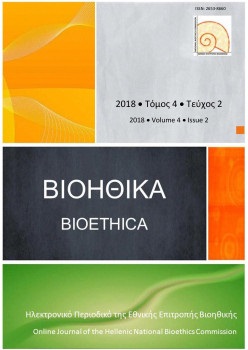Advance directives and personal identity

Abstract
Advance directives (ADs) are directives that a competent person gives in advance, for her treatment in case she is characterized (legally or by medical evaluation) incompetent for rational decision making that can guide action. ADs may be demands for active or passive euthanasia, raising legal and moral issues concerning their acceptance.
In bioethics, although the view supporting the decisive authority of ADs, without any presuppositions, as expressions of self determination and of “critical interests”, remains dominant, there are strong philosophical objections to their unconditional acceptance. There are two opposed views on this issue: a) The so called extension view that supports the moral authority of ADs. b) The moral authority objection view that questions the moral acceptance of ADs, focusing on the continuity of personal identity (PI) and on the existence of experiential interests. In this paper we attempt to criticize the dominant bioethical view about the moral justification of ADs based on the extension view, dwelling mainly on cases of “happy demented” patients, who have strong experiential interests that can conflict with the “extended” critical interests.
We thus examine first the more influential PI theories in bioethical discourse. These are the biological, the anthropological, the narrative and the psychological theories. Both psychological and narrative conceptions of PI adopt experiential data that are subject to relativistic evaluations and can lead to limitations of, and exceptions from, the concept of personhood. They both demand a thick first person identification of PI, which is then established as personal identity, supposedly grounding the authority of ADs. Despite their dominant position in bioethics, insofar as they lend support to the extension view, they face several objections.
We try to defend the moral authority objection regarding ADs, by adopting a Kantian transcendental account of PI, which provides a rigid kernel that grounds a conception of human dignity as independent from any experiential assessment of abilities. This conception of human dignity also includes patients incompetent to express their will, and is endangered by the unconditional acceptance of ADs. We also investigate a possible moral justification of ADs in Kantian ethics which appeals to Kant’s positions on suicide.
Article Details
- How to Cite
-
Μπούτλας (George Boutlas) Γ., & Βιρβιδάκης (Stelios Virvidakis) Σ. (2018). Advance directives and personal identity. Bioethica, 4(2), 17–32. https://doi.org/10.12681/bioeth.19688
- Section
- Original Articles
Authors who publish with this journal agree to the following terms:
- Authors retain copyright and grant the journal right of first publication with the work simultaneously licensed under a Creative Commons Attribution CC BY 4.0 License, which allows for immediate free access to the work and permits any user to read, download, copy, distribute, print, search, or link to the full texts of articles, crawl them for indexing, pass them as data to software, or use them for any other lawful purpose. Appropriate credit must be given by citing the author(s) and the original publication in this journal.
- Authors are able to enter into separate, additional contractual arrangements for the non-exclusive distribution of the journal's published version of the work (e.g. post it to an institutional repository or publish it in a book), with an acknowledgement of its initial publication in this journal.
We encourage authors to deposit their articles, as well as data underlying the publications, in institutional and/or other appropriate subject repositories.
Bioethica permits and encourages authors to archive the final publication pdf in institutional (e.g. the repository of the National Hellenic Research Foundation) or other appropriate subject repositories (e.g. SSOAR repository for social sciences), in compliance with institutional and/or funder open access policies, after publication in the BIOETHICA. Authors must provide bibliographic details that credit publication in the journal, as well as related funding details (when applicable).
Lists of institutional and other subject-based academic open access repositories can be found listed by country at the registry http://opendoar.org/countrylist.php
If your institution does not possess a repository you may deposit a copy of your paper at no cost with www.zenodo.org , the repository supported for open access research in the EU by the European Commission, through the project OpenAIRE (www.openaire.eu )


